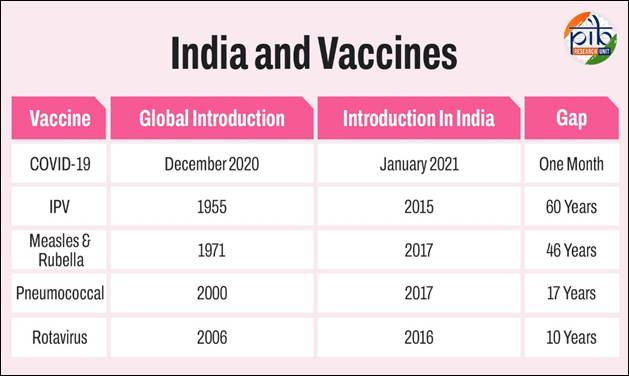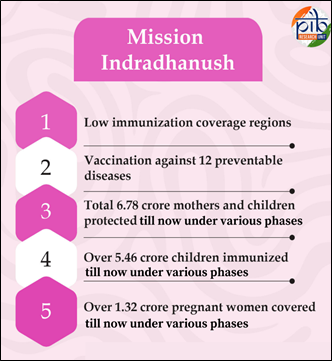Governance
India’s Vaccination Drive
- 27 Sep 2025
- 7 min read
For Prelims: Vaccination, Public health Interventions, Expanded Programme on Immunization (EPI), National Health Family Survey, Sustainable Development Goals (SDGs), Universal Immunization Programme (UIP), Mission Indradhanush, Pneumococcal Conjugate Vaccine (PCV), Accredited Social Health Activist.
For Mains: India’s Immunization Programme, Challenges and Reform.
Why in News?
India’s Universal Immunisation Programme (UIP), the world’s largest, vaccinates 2.6 crore infants and 2.9 crore pregnant women annually.
- Despite these significant numbers, challenges persist in reaching remote and migratory populations, clusters with low awareness, and communities grappling with vaccine hesitancy.
What is the Status of Immunisation in India?
- UIP: It is one of India's most comprehensive public health initiatives, aiming to provide life-saving vaccines to millions of newborns and pregnant women each year.
- The UIP offers free immunisation against 12 diseases.
- Sub-nationally: Rotavirus, Pneumococcal Pneumonia, and Japanese Encephalitis.
- Nationally: Diphtheria, Pertussis, Tetanus, Polio, Measles, Rubella, Childhood Tuberculosis, Hepatitis B, and Meningitis/Pneumonia (caused by Haemophilus Influenzae type B).
- Initially launched in 1978 as the Expanded Programme on Immunization, it was rebranded as the UIP in 1985 when its coverage was extended beyond urban centres to rural areas, addressing disparities in healthcare access.
- Mission Indradhanush: The Ministry of Health and Family Welfare launched Mission Indradhanush in December 2014 as a special drive to vaccinate all unvaccinated and partially vaccinated children under UIP.
- To further intensify the immunization programme, the Intensified Mission Indradhanush (IMI) was launched in October 2017.
- Intensified Mission Indradhanush (IMI) 5.0, 2023 is a catch-up vaccination campaign for children up to 5 years of age and pregnant women, who were left out.
- The Full Immunization coverage of the country is around 98% for the FY 2024-25.
- Key Achievements
- Polio Free: India’s achievement of polio-free status in 2014 represents one of the most significant successes in global public health.
- Tetanus Elimination: India is the first country to be officially acknowledged as being Yaws-free. India was validated for Maternal and Neonatal Tetanus Elimination (MNTE) in April 2015, much ahead of the global target date of December 2015.
- The U-WIN Digital Platform: It was launched nationwide to provide end-to-end vaccination tracking for pregnant women and children up to 16 years, building on the success of Co-WIN, and enabling anytime-anywhere access, especially for migratory populations.
- Logistics and Vaccine Stock Management: The electronic Vaccine Intelligence Network (eVIN) system is a real-time monitoring platform that manages vaccine logistics and is integrated into the broader health infrastructure under the Pradhan Mantri Ayushman Bharat Health Infrastructure Mission.
What are the Challenges to Achieving Universal Immunization in India?
- Remote Populations: Reaching remote, and tribal, remains particularly difficult in India due to geographic isolation, weak health infrastructure, and high mobility of communities, which significantly limits the reach of routine immunisation services.
- Especially in states like Uttar Pradesh, Bihar, and parts of the Northeast.
- Vaccine Hesitancy: Vaccine hesitancy continues to persist in specific clusters, often driven by misinformation, cultural beliefs, and anti-vaccine narratives.
- Pandemic Disruption: The COVID-19 pandemic caused unprecedented disruption to routine immunisation services, resulting in temporary immunity gaps and localized resurgent measles outbreaks across India, particularly in areas with previously low coverage.
- Low Awareness: Clusters with low awareness and limited access to healthcare services continue to substantially hinder universal coverage, particularly in densely populated slums and marginalised areas, where health system outreach is often inadequate.
What Measures can be Taken to Achieve Universal Immunization in India?
- Strengthening National Immunization Days (NIDs): The success of initiatives like National Immunization Days (NIDs) should be replicated in other vaccination drives, ensuring that special campaigns, like the Pulse Polio program, reach every child, year after year.
- Expanding Strategic Interventions: Continued focus on advocacy, social mobilization, interpersonal communication at the family level, and media engagement needs to be intensified to raise awareness and drive higher immunization coverage.
- Strengthening Task Forces at All Levels: Initiatives, such as strengthening State, District, and Block Task Forces on Immunization (STFI, DTFI, BTFI), should be further emphasized to ensure better coordination and effective program implementation across all regions.
- Scaling Up Supplementary Immunization Campaigns: More extensive supplementary immunization campaigns should be conducted in areas with low coverage to target left-out and drop-out children, as well as pregnant women, ensuring no one is left behind.
- Enhancing Village Health and Nutrition Days (VHND): Organizing more frequent and widespread VHNDs can ensure greater access to immunization services, particularly in remote and underserved villages.
- Promoting Digital Tracking with UWIN Portal: Expanding the use of the UWIN portal for digital registration and tracking of vaccinations should be a priority to ensure accurate record-keeping and easy monitoring of immunization events.
Conclusion
India's Universal Immunization Programme is a global model in public health, showing remarkable progress through strategic campaigns, digital innovations, and international collaborations. Addressing remaining gaps in coverage, vaccine hesitancy, and outreach to underserved populations is essential to maintain and further enhance public health outcomes.
|
Drishti Mains Question: Q. Discuss the importance of vaccination for healthcare, particularly in developing countries like India. Also, discuss the measures taken by India to ensure universal immunisation of our population. |
UPSC Previous Year Question (PYQ)
Prelims
Q. 'Mission Indradhanush' launched by the Government of India pertains to: (2016)
(a) Immunization of children and pregnant women
(b) Construction of smart cities across the country
(c) India's own search for Earth-like planets in outer space
(d) New Educational Policy
Ans: A








